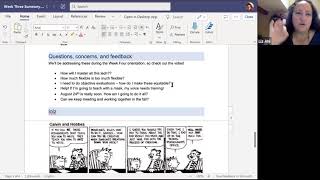Week Four: Tying It Together
Resources & Opportunities
- Drop-in Hours: Monday – Friday, 8:30-9:30 AM EDT in the PSU Workshop VidSpace
(Note: Monday morning’s hour will always be an orientation session for the week and will be recorded and shared on this Web site. Other days will be less formal and not recorded.) - Something Fun: Add your favorite quarantine recipe (meal, baked goods, cocktail) to this weeks RECIPE channel in Teams!
- Get Outta Town: “Good Practices in Online Teaching from Those Who Wrote the Books,” a free webinar from WCET on August 6 at 2pm.
- Connect with Courses: TBD
This Week in Learning Cohorts
Meet with your mentor individually for 30 minutes between Thursday, August 6 and Wednesday, August 12 to complete your Guided Self-Assessment (GSA).
This Week's Schedule
- Monday
- Tuesday
- Wednesday
- Thursday
-
 Friday
Friday
QUESTIONNAIRE REVIEW & REFLECTION
Watch
Join us in the VidSpace from 8:30-9:30 EST for our Weekly Orientation in which we’ll talk about the Guided Self-Assessment, which is this week’s major project.
Review
Look over your initial Intake Questionnaire responses.
PSU participants will have these emailed to them today. Participants at other institutions should check with their Workshop Facilitators.
Reflect
In your Guided Self-Assessment (GSA), answer the “Intake Questionnaire Reflection” questions.
“reflect icon” made by Kiranshastry from www.flaticon.com
COURSE MODEL REVIEW & REFLECTION
Review
Reflect
In your GSA, answer the “Four Models for HiFlex Course Design” question.
SYLLABUS DESIGN
Read (Optional)
Create
Work on the syllabus for your course, pulling together all the relevant assignments and ideas you’ve been collecting in your Workbook.
Share your draft syllabus in your GSA (you can copy/paste the entire thing or add a link to an online shared version of your syllabus).
CHECKLIST REVIEW
Annotate
In your GSA, go through the Checklist section. You will find it divided up into each week (note the items from this week, as well!). Review each item in the checklist, and mark off the things you have completed.
In the Notes column, record your thoughts and ideas. Make sure you mention any you haven’t completed, explaining why they are not addressed.
Make sure your annotations are robust enough that your mentor will be able to understand and engage with what you are sharing.
WRAP-UP & GUIDED SELF-ASSESSMENT
Reflect (Optional)
In the “Talk About Whatever” space in the Discussion Forum, post something to mark the conclusion of this workshop experience!
Meet
Arrange to meet with your mentor individually for 30 minutes between Thursday, August 6 and Wednesday, August 12 to complete your Guided Self-Assessment.
Complete Checklist
Week One (Adaptability)
Workshop Curriculum: covered in this week’s work
- I’ve developed a course course model plan.
- I’ve planned my course with some contingencies baked in, either by considering HiFlex or modular approaches to my course design.
- In the case of a modality change, I’m prepared to explain to students how the course has changed from the original format and what they need to do to continue their work.
- I’ve considered and established how I can be flexible with my students with regards to deadlines.
- If I teach courses with experiential components (labs, field trips, clinicals, performances, etc.), I’ve researched and prepared for alternative assignment ideas.
- Regardless of whether we are coming back f2f, hybrid, or remote, I have created an online presence (using my LMS, a custom-built site, a tool like Teams/Slack, etc.) for each of my courses with current course information, and I’ve organized this online course environment to make it easy for students to find what they are looking for.
- I have communicated clearly with my students what is expected of them with regards to class interaction and communication, and how they can use the tools chosen for the class to achieve this.
Don’t Forget: three basic planning elements that we expect you have covered outside of this workshop
- I’ve thought intentionally and deliberately about how I want to teach my class.
- I know my objectives and how I want my students to reach those goals, whether through careful, deliberate planning or a more organic and emergent process.
- I know how to share any media files I use (images, audio, video) with my students.
Week Two (Connection)
Workshop Curriculum: covered in this week’s work
- Students have a way to contact each other and collaborate remotely/online, and I’ve invited them to introduce themselves to the class using one of the communication tools for the class.
- I have thought deliberately about how to foster community and connection in my classes, regardless of modality.
- I have a way to facilitate discussion with groups of students remotely, and I’m comfortable using the tool(s) I’ve chosen. (Some options: Teams, LMS Discussion Forum, Twitter)
- I’ve chosen technologies and tools that will facilitate active, participatory learning.
- I have acknowledged the context in which the course sits, and have weighed options for connecting the curriculum to current events and discourses.
- If I’ve decided to deliver lectures online, I know what tools I want to use to use and how to make these lectures accessible.
- When sharing media online, I’ve considered ease-of-use (e.g. shorter “chunks” of video) for content I’m creating or sharing.
Don’t Forget: three basic planning elements that we expect you have covered outside of this workshop
- Regardless of whether we are coming back f2f, hybrid, or remote, my students know how to contact me, what to expect from me, and when I’m available.
- I’ve provided clear information about how, when, and where students can access information about their progress in the class. I have a plan for communicating with students about this progress and providing feedback on their work.
- I have chosen a way to distribute course assignments and materials to my students that will help them meet the course’s instructional goals, and I’ve made clear how students should use materials to complete their work and assignments.
Week Three (Equity)
Workshop Curriculum: covered in this week’s work
- I’ve informed students about how they can use technology in the class safely, protecting their data and privacy.
- I’ve developed a syllabus for my course that acknowledges my students basic needs and my care for them.
- I’ve considered Open Education Resources for my course and incorporated them when/if appropriate.
- I’ve familiarized myself with accessibility standards and Universal Design for Learning practices to ensure my course material is accessible to students.
- I’ve considered how I might need to adapt my grading and assessment approaches if the modality of my class changes and/or university policies change.
- I’ve educated myself about what to do if my students or I experience trouble accessing the necessary tech.
- I’ve explained any technology requirements to students and pointed them to where they can go for help with technology help, questions, or concerns.
Don’t Forget: three basic planning elements that we expect you have covered outside of this workshop
- I’ve cited all my course materials appropriately.
- I’ve shared information with my students about how they can request accommodations and what accessibility and academic support services on campus are available to help them.
- I have the technology I need to work at home or I’ve reached out to my supervisor/administration to obtain what I need.
Week Four (Tying It All Together)
- Regardless of what pedagogical approach is most important and natural to me, I’ve considered how modality impacts this choice, and I’ve prepared to be adaptive, connected, and equitable in my approach to teaching.
- I have a fall course syllabus that reflects my engagement with the ACE Framework.
- If I need help, I’ve reached out to the instructional design and academic technology staff at my institution to talk about my teaching approach and my course planning.



